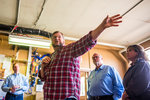
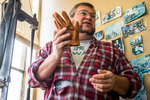

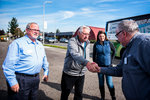
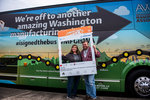
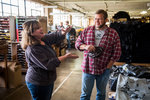
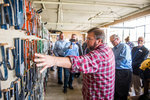
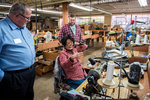
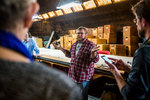
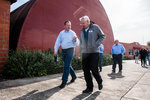

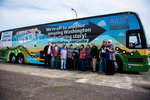

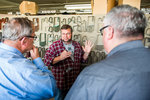
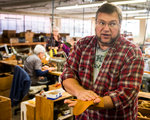
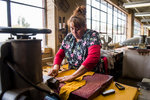
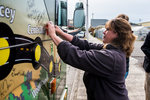
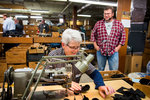
The smell of deer, elk, goat and bison hides wafted through the air at the Churchill Glove Factory Wednesday as decades-old machines hummed and banged and a handful of workers meticulously carried out their roles in a craft that has remained in downtown Centralia since the business first opened in 1895.
There’s an air of timelessness inside the brick, nondescript manufacturing business at 544 North Pearl St. where not much has changed when it comes to creating high-quality leather gloves that are used by workers, rodeo professionals, motorcyclists and even movie stars and professional athletes.
Despite the look of things, though, the business has changed immensely since James Churchill, a wagon peddler selling tin ware and crockery, first set up shop in Centralia 124 years ago.
Those changes — from a transformation in clientele to constant efforts to counter international importers — were among the top points of discussion Wednesday as Churchill Glove was one of the first stops on a sweeping tour of manufacturing businesses across the state by the Association of Washington Business.
Executives and staffers from AWB, the largest and oldest statewide business association in Washington, toured the facility, asked questions and sought to highlight its place as one of the state’s resilient and passionate small manufacturers.
They were joined by local dignitaries, among them Mayor Lee Coumbs, Mayor Pro Tem Max Vogt and Lewis County Commissioner Edna Fund.
Andy and Andrea Churchill, the fourth-generation owners of the business, explained how their entire model changed as the timber industry suffered from the spotted owl era. These days, they export large amounts of motorcycle gloves to other countries, with Asia and specifically Japan representing the largest international destination.
{{tncms-inline content="<p dir="ltr"><span>Glove Landmark Handed a Rest in 1958&nbsp;</span></p> <p dir="ltr"><span>During April 1958, the Churchill Glove Factory at 113 West Maple St., Centralias&rsquo; oldest industry, was quiet for the first time in 50 years.</span></p> <p dir="ltr"><span>The more modern plant at 544 North Pearl St. would be the only manufacturing site.</span></p> <p dir="ltr"><span>In the 1890s, James Churchill was a wagon peddler selling tin ware and crockery.</span></p> <p dir="ltr"><span>One day he traded some crockery for some raw deer hides. Few people had much money to spend in those days and it looked for a while as if he&rsquo;d made a bad trade, The Chronicle wrote.</span></p> <p dir="ltr"><span>But thrifty James Churchill took the hides to a tanner and had them processed. Then he sat down and made sets of gloves by hand.</span></p> <p dir="ltr"><span>They were great sellers, so he opened a factory at what is now the American Legion Hall. He later expanded and moved to Maple Street.</span></p> <p dir="ltr"><span>In the old factory, James Churchill had written phone numbers on the wall by the phone. The plant had been painted many times since 1932, but the numbers were never painted over.</span></p> <p><span>&nbsp;</span></p>" id="bcc52a92-0824-42ad-bfda-d7d70b0a268d" style-type="info" title="From the Archives" type="relcontent"}}
It now counts Harley-Davidson and other motorcycle retailers as clients, but the one thing that hasn’t changed is the dedication to producing high-quality, American-made gloves that don’t wear out.
“We had to go find business someplace else,” Andy Churchill said.
In the peak years, the business employed as many as 80 people. These days, that number hovers around 12, including the Churchills, but they’ve continued to create a high volume of products. Andrea Churchill estimated the business sold 22,500 pairs of gloves last year.
There’s no automation at the facility. Every piece of work requires the hands of loyal staff members.
“One by one, finger by finger, they get made right here,” she said while standing alongside sewers, some of whom have worked for the business for up to four decades.
AWB President Kris Johnson said the Churchill Glove Factory has a lot in common with other manufacturing businesses across Washington, which when combined account for 12 percent of the state’s economy and produce $58 billion in goods each year.
“It’s the story about drive and passion and commitment to the product they make and the customers,” Johnson said. “It rings so true for so many manufacturers in our state … It’s also an example of resiliency. They started making gloves for the timber industry. They had to adapt. The resiliency and passion warms my heart.”
Across the state, there are nearly 300,000 manufacturing employees, he said, adding that he hopes the Manufacturing Week tour can shed light on the importance of the sector.
Since 1998, there has been an overall drop of 21.5 percent in manufacturing employment in Washington while all other sectors have seen growth.
He said the businesses could use some help from the state Legislature, from a flat-rate Business and Occupation Tax for all businesses to programs for educating the workforce.
“There are 3,100 people, 3,100 men and women every day who wake up and go to work for a manufacturer each day in Lewis County,” he said.
At Churchill Glove Factory, the owners lamented the steep price of federal oversight when it comes to inspections. While the USDA might not inspect every shipment of the product, they nonetheless levy onerous fees.
It’s just one of the challenges the business has overcome in its 12 decades of existence, the largest perhaps being the shift from the foundational support of the logging industry to an expansion into other markets.
Today, the company is an internationally respected maker of motorcycle gloves, work gloves, and gloves used in the rodeo circuit.
They’ve also had some famous customers over the years.
Gloves worn by Arnold Schwarzenegger in “The Terminator” movie were made in Centralia, as were a special pair of size 16 gloves for NBA superstar Shaquille O’Neal. The gloves worn by the Marlboro Man in print advertisements were made a Churchill Glove Factory, as were pairs made for FOX football analyst and former NFL star Terry Bradshaw as well as NBA Hall of Famer Michael Jordan.
{{tncms-inline content="<p dir="ltr">While the Churchill Glove Factory is among the last businesses of its kind in the United States, there are actually two such businesses in Centralia. Geier Glove operates on Main Street in Centralia. According to The Chronicle&rsquo;s archives, the founding Geier members, Art and Henry, left the Churchill company in the late 1920s to start their own glove-making business. The two businesses still compete against one another today as two of the last remaining businesses of their kind.</p> <p><span>&nbsp;</span></p>" id="8a138b43-76fc-48c8-b572-0345c27e3758" style-type="info" title="Not the Only Glove Maker in Town " type="relcontent"}}
“There’s been some interesting clients,” Andy Churchill said.
Following the terrorist attacks of Sept. 11, 2001, Churchill Glove Factory in Centralia packed up 31 boxes of heavy-duty gloves to be sent to rescue workers at Ground Zero in New York, according to Chronicle archives. The 2,000 cowhide and deerskin gloves were sent off with flag decals on each cardboard box.
Johnson, the AWB president, noted that his organization selected businesses of all sizes to highlight on the Manufacturing Week Tour because they all play an important and diverse role in the state’s economy.
“We’re spotlighting how important and how vibrant the manufacturing sector is to the state’s economy,” he said. “From the garage up to Boeing and everything in between. That’s what so special about this.”